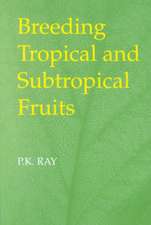The Jatropha Genome: Compendium of Plant Genomes
Editat de Suguru Tsuchimotoen Limba Engleză Hardback – 11 dec 2017
| Toate formatele și edițiile | Preț | Express |
|---|---|---|
| Paperback (1) | 790.09 lei 38-44 zile | |
| Springer International Publishing – 30 aug 2018 | 790.09 lei 38-44 zile | |
| Hardback (1) | 956.03 lei 6-8 săpt. | |
| Springer International Publishing – 11 dec 2017 | 956.03 lei 6-8 săpt. |
Din seria Compendium of Plant Genomes
- 24%
 Preț: 783.67 lei
Preț: 783.67 lei - 18%
 Preț: 948.92 lei
Preț: 948.92 lei - 15%
 Preț: 643.34 lei
Preț: 643.34 lei - 15%
 Preț: 643.84 lei
Preț: 643.84 lei - 18%
 Preț: 950.21 lei
Preț: 950.21 lei - 18%
 Preț: 956.18 lei
Preț: 956.18 lei - 18%
 Preț: 1398.00 lei
Preț: 1398.00 lei - 18%
 Preț: 1396.89 lei
Preț: 1396.89 lei - 15%
 Preț: 645.28 lei
Preț: 645.28 lei - 18%
 Preț: 1119.74 lei
Preț: 1119.74 lei - 18%
 Preț: 947.98 lei
Preț: 947.98 lei - 18%
 Preț: 954.93 lei
Preț: 954.93 lei - 18%
 Preț: 957.44 lei
Preț: 957.44 lei - 18%
 Preț: 1114.97 lei
Preț: 1114.97 lei - 18%
 Preț: 956.69 lei
Preț: 956.69 lei - 18%
 Preț: 951.91 lei
Preț: 951.91 lei - 18%
 Preț: 952.89 lei
Preț: 952.89 lei - 18%
 Preț: 952.57 lei
Preț: 952.57 lei - 18%
 Preț: 953.97 lei
Preț: 953.97 lei - 18%
 Preț: 950.33 lei
Preț: 950.33 lei - 18%
 Preț: 1228.96 lei
Preț: 1228.96 lei - 18%
 Preț: 951.77 lei
Preț: 951.77 lei - 18%
 Preț: 955.56 lei
Preț: 955.56 lei - 15%
 Preț: 643.48 lei
Preț: 643.48 lei - 15%
 Preț: 646.30 lei
Preț: 646.30 lei - 18%
 Preț: 1113.26 lei
Preț: 1113.26 lei - 15%
 Preț: 643.65 lei
Preț: 643.65 lei - 15%
 Preț: 633.53 lei
Preț: 633.53 lei - 18%
 Preț: 951.59 lei
Preț: 951.59 lei - 18%
 Preț: 1119.56 lei
Preț: 1119.56 lei - 18%
 Preț: 1115.46 lei
Preț: 1115.46 lei - 18%
 Preț: 946.41 lei
Preț: 946.41 lei - 18%
 Preț: 950.33 lei
Preț: 950.33 lei - 18%
 Preț: 955.56 lei
Preț: 955.56 lei - 18%
 Preț: 951.77 lei
Preț: 951.77 lei - 18%
 Preț: 947.98 lei
Preț: 947.98 lei - 18%
 Preț: 1669.96 lei
Preț: 1669.96 lei - 18%
 Preț: 1123.98 lei
Preț: 1123.98 lei - 18%
 Preț: 1114.52 lei
Preț: 1114.52 lei - 18%
 Preț: 954.62 lei
Preț: 954.62 lei
Preț: 956.03 lei
Preț vechi: 1165.88 lei
-18% Nou
Puncte Express: 1434
Preț estimativ în valută:
182.96€ • 190.31$ • 151.04£
182.96€ • 190.31$ • 151.04£
Carte tipărită la comandă
Livrare economică 14-28 aprilie
Preluare comenzi: 021 569.72.76
Specificații
ISBN-13: 9783319496511
ISBN-10: 3319496514
Pagini: 375
Ilustrații: XVI, 288 p. 74 illus., 59 illus. in color.
Dimensiuni: 178 x 254 mm
Greutate: 0.75 kg
Ediția:1st ed. 2017
Editura: Springer International Publishing
Colecția Springer
Seria Compendium of Plant Genomes
Locul publicării:Cham, Switzerland
ISBN-10: 3319496514
Pagini: 375
Ilustrații: XVI, 288 p. 74 illus., 59 illus. in color.
Dimensiuni: 178 x 254 mm
Greutate: 0.75 kg
Ediția:1st ed. 2017
Editura: Springer International Publishing
Colecția Springer
Seria Compendium of Plant Genomes
Locul publicării:Cham, Switzerland
Cuprins
Outline, Kiichi Fukui (Osaka University).- Part I Genome and Molecular Analyses: Genome and chromosomes, Naoki Wada (Osaka University).- Genome Analysis, Hideki Hirakawa (Kazusa DNA Institute) and Shusei Sato (Tohoku University).- Transcription factors, Keiichi Mochida (RIKEN plant Science Center).- Molecular marker, Atefeh Alipour (Osaka University).- Linkage map, Chun Ming Wang (National University of Singapore).-Part II Metabolomics and Physiology: Toxic substances, Taku Demura (Nara Institute of Science and Technology).- Metabolomics, Daisuke Shibata (Kazusa DNA Institute).-Flowering, Nobuko Ohmido (Kobe University).- Part III Genetics and Phylogenetics: Core collection, Hisashi Tsujimoto (Tottori University).- QTL analysis, Peng Liu (National University of Singapore).- Association Analysis, Tomoe Inoue (Tottori University).- Phylogeny, Fatemeh Maghuly (University of National Resources and Life Sciences, Vienna, Austria).- Part IV Breeding and Application: Super jatropha, Alfredo Zamarripa (INIFAP, Mexico).- Selection of drought-tolerant lines, Irish Bagsic (University of Philippines).- Utilization of waste water, Adel Hegazy (Sadat City University, Egypt).- Transgenic plants, Joyce Cartagena (Nagoya University).
Textul de pe ultima copertă
This book presents the genetics and genomics of Jatropha, which is used for biofuel, and shows how plant genomics can be used to improve plant breeding. The utilization of plant biofuels is a promising solution to global issues such as the depletion of fossil fuels and resources and climate change. Jatropha curcas L. (jatropha) is a species of shrub belonging to the Euphorbiaceae family. Native to Mesoamerica, it is now grown widely in tropical and subtropical areas in America, Africa and Asia. The seed oil of Jatropha is a suitable source for biodiesel or bio jet fuel, and since it is not edible and can grow in semi-arid lands unsuitable for the cultivation of food crops, its production does not compete with that of food to inflate its price. The characteristics of this promising biofuel plant, however, have not been fully exploited in terms of breeding, mainly because of the lack of information on its genetics and genomics. The structure of the whole genome of Jatropha is analyzed, providing insights into on the plant’s genetic system and accelerating the molecular breeding process.
Caracteristici
Presents the genetics and genomics of the biofuel plant Jatropha Demonstrates how scientific results in plant genomics can be used to improve plant breeding Includes contributions from an international board of authors Includes supplementary material: sn.pub/extras




